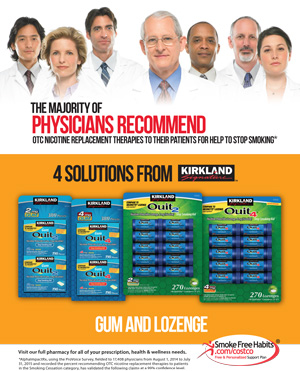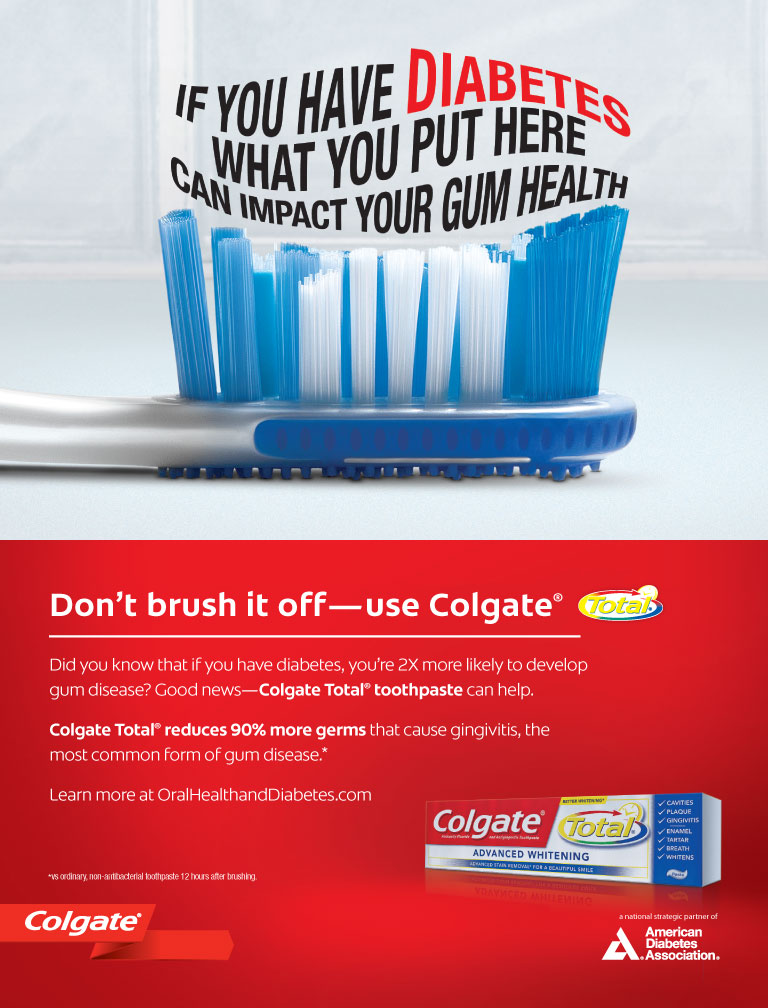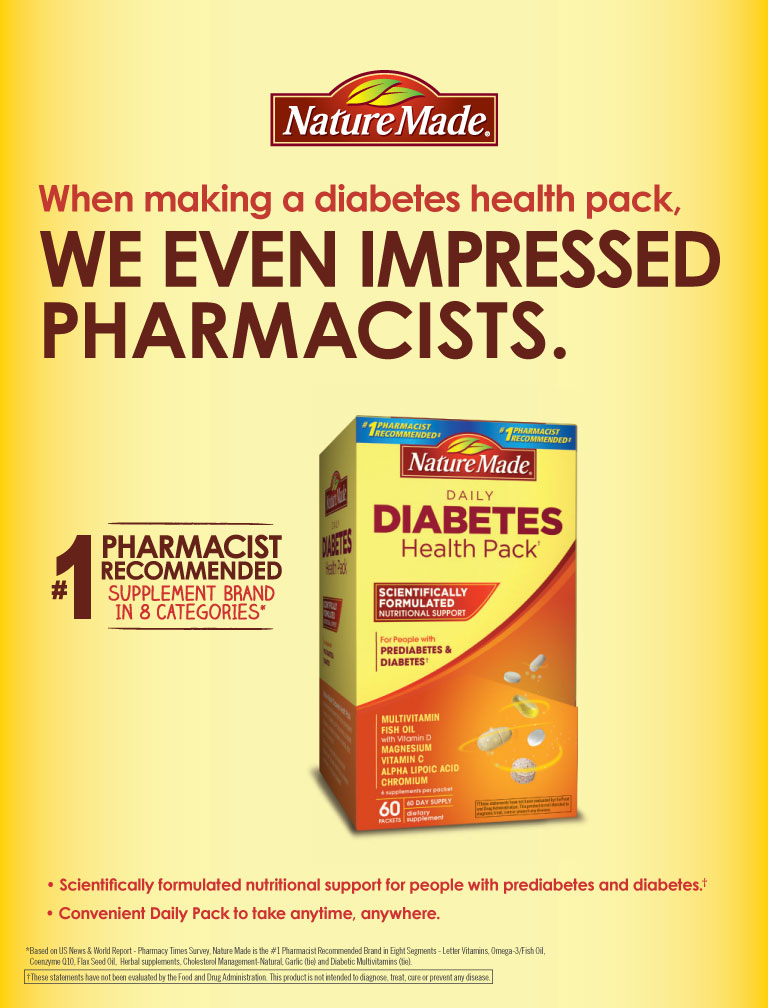
Robbie Almeida, a Costco pharmacist in Ann Arbor, Michigan, finally?quit smoking?after 15 years of advising her customers to do the same. This is how she did it. As a pharmacist, Robbie knew about the health benefits of vitamins and other supplements. She also knew that certain vitamins and supplements would help her?quit smoking. “I take a multivitamin. I take triglycerides. I take flaxseed oil, probiotics and CoQ10. And I take a calcium pill.” Robbie tells her customers at Costco pharmacy that wanting to?quit?is the first big step. For Robbie, once she made that decision, the rest followed easily. “Honestly, I just did it cold turkey. I remember I had my last cigarette at my friend’s house, and I was done. I stayed away from smoking areas so I wasn’t tempted or craving or anything like that. I wanted to?quit, so that’s how I did it. Now if I smell cigarette smoke it makes me ill. I don’t like it at all, and I think, ‘Oh, that was really gross.’ How could I have been doing that for so long?” Most people won’t be able to?quit?cold turkey like Robbie, but making that decision is an important first step. Even when she was smoking, Robbie knew that she was harming her health. Like so many people, she started smoking as a teenager. She thought “everyone” was doing it, and it seemed so cool. Then, as a pharmacist, she had to talk to her customers about the risks of smoking and advise them to?quit. It was hard to hear that smoking raises your risk of heart disease and diabetes almost every day. “The health benefits of it all–how does it make sense to put something foreign into our systems? My kids are nine and eight. They don’t remember when I was still a smoker; it’s been over 10 years. But I tell them about it so that they won’t start like I did. I tell them that it doesn’t make any sense. You’re putting something in your body that doesn’t belong there. “There’s disease. There’s pre-mature death. And the sooner you?quit, the sooner your lungs can start to recover. Back when I was smoking, I had pleurisy in my lungs, like there was an infection in the lining. Right now I feel that my lungs are probably close to 100% healthy.” Robbie?quit?soon after finishing pharmacy school. She admits that she smoked through school because of the stress. But learning about lung cancer, heart disease, strokes–she realized that it was time. She also saw what it was doing to her patients. “We measure patients’ lung capacity, and every year or so and I have to talk to the smokers about the benefits of?stopping.?You can tell right away when they blow into the tube and they can’t breathe that they have had decades of smoking. It’s really bad. And then of course they have to rely on drugs, like inhalers, and everything else that goes along with smoking-related diseases, and all that is very costly. So, it doesn’t make any sense. “I’ve had patients come to me with nicotine gum and ask me whether it works or not. I tell them that they have to be willing to quit, because if they’re not, nothing will really work. I haven’t been monitoring exactly how many patches or over-the-counter products people are buying now thanks to their New Year’s resolutions, but more people are coming to the pharmacy and talking to me about?quitting. “I believe in determination. In my mind I was done smoking, so that’s why I was able to?quit. It’s up to each individual to realize the benefits of?quitting?and to decide how to do it. A lot of people use the gum or the patch. That’s fine. With the gum, heavy smokers can start off with a higher dosage to decrease the craving, and then gradually decrease the dose as they start smoking less. They taper down until they get to the lower dose and then, hopefully, the cravings won’t be there and they will have?quit.” Family history also plays a role. Robbie’s father smoked until she was born. Like Robbie, he?stopped?before his children saw him smoking. But Robbie’s grandfather smoked and great grandmother also smoked. Robbie’s grandfather died of complications from smoking; most likely, it aggravated his heart disease. Robbie has been taking calcium ever since she finished school to avoid osteoporosis. She wants to keep strong bones so that she’ll be healthy for his children “A lot of older smokers don’t think like that. They are pretty much addicted and they can’t stop. My children are always on my mind. I have to be healthy for them, so everything that I’m doing is so that I can be with them longer.” By?Jonathan Jarashow
The post Quitting Smoking: A Costco pharmacist’s story appeared first on Fall 2016 Issue | CDiabetes Online Magazine.
]]>
 Robbie Almeida, a Costco pharmacist in Ann Arbor, Michigan, finally?quit smoking?after 15 years of advising her customers to do the same. This is how she did it.
Robbie Almeida, a Costco pharmacist in Ann Arbor, Michigan, finally?quit smoking?after 15 years of advising her customers to do the same. This is how she did it.
As a pharmacist, Robbie knew about the health benefits of vitamins and other supplements. She also knew that certain vitamins and supplements would help her?quit smoking.
“I take a multivitamin. I take triglycerides. I take flaxseed oil, probiotics and CoQ10. And I take a calcium pill.”
Robbie tells her customers at Costco pharmacy that wanting to?quit?is the first big step. For Robbie, once she made that decision, the rest followed easily.
“Honestly, I just did it cold turkey. I remember I had my last cigarette at my friend’s house, and I was done. I stayed away from smoking areas so I wasn’t tempted or craving or anything like that. I wanted to?quit, so that’s how I did it. Now if I smell cigarette smoke it makes me ill. I don’t like it at all, and I think, ‘Oh, that was really gross.’ How could I have been doing that for so long?”
Most people won’t be able to?quit?cold turkey like Robbie, but making that decision is an important first step.
Even when she was smoking, Robbie knew that she was harming her health. Like so many people, she started smoking as a teenager. She thought “everyone” was doing it, and it seemed so cool. Then, as a pharmacist, she had to talk to her customers about the risks of smoking and advise them to?quit. It was hard to hear that smoking raises your risk of heart disease and diabetes almost every day.
“The health benefits of it all–how does it make sense to put something foreign into our systems? My kids are nine and eight. They don’t remember when I was still a smoker; it’s been over 10 years. But I tell them about it so that they won’t start like I did. I tell them that it doesn’t make any sense. You’re putting something in your body that doesn’t belong there.
“There’s disease. There’s pre-mature death. And the sooner you?quit, the sooner your lungs can start to recover. Back when I was smoking, I had pleurisy in my lungs, like there was an infection in the lining. Right now I feel that my lungs are probably close to 100% healthy.”
Robbie?quit?soon after finishing pharmacy school. She admits that she smoked through school because of the stress. But learning about lung cancer, heart disease, strokes–she realized that it was time. She also saw what it was doing to her patients.
“We measure patients’ lung capacity, and every year or so and I have to talk to the smokers about the benefits of?stopping.?You can tell right away when they blow into the tube and they can’t breathe that they have had decades of smoking. It’s really bad. And then of course they have to rely on drugs, like inhalers, and everything else that goes along with smoking-related diseases, and all that is very costly. So, it doesn’t make any sense.
“I’ve had patients come to me with nicotine gum and ask me whether it works or not. I tell them that they have to be willing to quit, because if they’re not, nothing will really work. I haven’t been monitoring exactly how many patches or over-the-counter products people are buying now thanks to their New Year’s resolutions, but more people are coming to the pharmacy and talking to me about?quitting.
“I believe in determination. In my mind I was done smoking, so that’s why I was able to?quit. It’s up to each individual to realize the benefits of?quitting?and to decide how to do it. A lot of people use the gum or the patch. That’s fine. With the gum, heavy smokers can start off with a higher dosage to decrease the craving, and then gradually decrease the dose as they start smoking less. They taper down until they get to the lower dose and then, hopefully, the cravings won’t be there and they will have?quit.”
Family history also plays a role. Robbie’s father smoked until she was born. Like Robbie, he?stopped?before his children saw him smoking. But Robbie’s grandfather smoked and great grandmother also smoked. Robbie’s grandfather died of complications from smoking; most likely, it aggravated his heart disease. Robbie has been taking calcium ever since she finished school to avoid osteoporosis. She wants to keep strong bones so that she’ll be healthy for his children
“A lot of older smokers don’t think like that. They are pretty much addicted and they can’t stop. My children are always on my mind. I have to be healthy for them, so everything that I’m doing is so that I can be with them longer.”
By?Jonathan Jarashow
The post Quitting Smoking: A Costco pharmacist’s story appeared first on Fall 2016 Issue | CDiabetes Online Magazine.
]]>
By Robert Ehrman, MD If you have diabetes, you probably know that you are at an increased risk for problems with your eyes, feet, skin?and nervous system. Did you know that diabetes can also cause problems in your mouth? Take Care Of Your Teeth Poor blood glucose control lets bacteria grow easily in your mouth. Having lots of bacteria in your mouth lead to?plaque buildup on your teeth. When this happens, your gums begin to pull away from your teeth, and pockets form between your teeth and gums. These pockets can become filled with germs and small bits of food. The gums then become inflamed and may bleed when you eat or brush your teeth. This condition is called “gingivitis”. Keeping your gums healthy is important because they help to hold your teeth in place. If nothing is done, you can get an infection in your gums that can go on to destroy the bone around your teeth, and they may start to move. Your teeth may fall out or need to be pulled. A recent study at the University of Copenhagen in Denmark looked at the link between oral health and diabetes. The study found that people with good oral health practices, along with a healthy diet and good stress management, had?lower blood glucose levels and healthier teeth and gums. Diabetes: A Major Cause Of Gum Disease There are many causes of gum disease, including smoking, hormonal changes, and certain cancers. Some medicines can?make your mouth dry, which can increase your risk for tooth and gum problems. This is because saliva helps slow the growth of bacteria and keeps your mouth healthy overall. Poorly controlled diabetes can also lead to gum disease. High levels of sugar in saliva make it easy for bacteria to grow there. This is why poorly controlled diabetes is a risk factor for gum disease. Also, diabetes can cause problems with blood flow to your teeth and gums. This makes it harder to repair damage to your gums and fight infection. It is also important to understand that if you develop gum disease from poor oral habits or other reasons, this could make it harder for you to control your diabetes. Other oral problems related to diabetes include: Thrush: this is an infection caused by a fungus that grows in the mouth and throat Dry mouth: this can cause soreness, ulcers, infections and cavities Dental Check-ups Are Important It’s important that you tell your dentist if you have diabetes, and keep them informed of any changes in your condition or medicines. Postpone any non-emergency dental procedures if your blood sugar is not well controlled. What Can You Do To Keep Your Mouth Healthy? The most important thing you can do is control your blood glucose levels. Have dental check-ups every six months?if possible. Avoid smoking and, if you wear dentures, remove and clean them every day. Good blood glucose control can also help prevent or relieve the dry mouth diabetes can cause. Here are some simple tips for a healthy mouth: Keep your blood glucose level under control Brush and floss every day Visit your dentist at least every 6 months. Be sure to tell them that you have diabetes Tell your dentist if your dentures do not fit right, or if your gums are sore Stop smoking. Your healthcare provider or dentist can tell you about what options there are to help you quit Call your dentist if you notice a problem. Take time to check your mouth regularly for any problems. If your gums bleed when you brush or floss, or if you notice dryness, soreness, white patches, or a bad taste in your mouth, contact your dentist right away. Remember, good blood glucose control can help keep your mouth happy and healthy for years to come. 6 Signs Of Gum Disease Red or swollen gums Gums that bleed easily when brushing or flossing Receding gums (pulling away from teeth) Loose teeth, making it hard to bite and chew Constant bad breath Dentures that don’t fit anymore
The post Oral Health And Diabetes appeared first on Fall 2016 Issue | CDiabetes Online Magazine.
]]>
By Robert Ehrman, MD
If you have diabetes, you probably know that you are at an increased risk for problems with your eyes, feet, skin?and nervous system. Did you know that diabetes can also cause problems in your mouth?
Take Care Of Your Teeth
Poor blood glucose control lets bacteria grow easily in your mouth. Having lots of bacteria in your mouth lead to?plaque buildup on your teeth. When this happens, your gums begin to pull away from your teeth, and pockets form between your teeth and gums. These pockets can become filled with germs and small bits of food. The gums then become inflamed and may bleed when you eat or brush your teeth. This condition is called “gingivitis”.
Keeping your gums healthy is important because they help to hold your teeth in place. If nothing is done, you can get an infection in your gums that can go on to destroy the bone around your teeth, and they may start to move. Your teeth may fall out or need to be pulled.
A recent study at the University of Copenhagen in Denmark looked at the link between oral health and diabetes. The study found that people with good oral health practices, along with a healthy diet and good stress management, had?lower blood glucose levels and healthier teeth and gums.
Diabetes: A Major Cause Of Gum Disease
There are many causes of gum disease, including smoking, hormonal changes, and certain cancers. Some medicines can?make your mouth dry, which can increase your risk for tooth and gum problems. This is because saliva helps slow the growth of bacteria and keeps your mouth healthy overall. Poorly controlled diabetes can also lead to gum disease.
High levels of sugar in saliva make it easy for bacteria to grow there. This is why poorly controlled diabetes is a risk factor for gum disease. Also, diabetes can cause problems with blood flow to your teeth and gums. This makes it harder to repair damage to your gums and fight infection. It is also important to understand that if you develop gum disease from poor oral habits or other reasons, this could make it harder for you to control your diabetes.
Other oral problems related to diabetes include:
- Thrush: this is an infection caused by a fungus that grows in the mouth and throat
- Dry mouth: this can cause soreness, ulcers, infections and cavities
Dental Check-ups Are Important
It’s important that you tell your dentist if you have diabetes, and keep them informed of any changes in your condition or medicines. Postpone any non-emergency dental procedures if your blood sugar is not well controlled.
What Can You Do To Keep Your Mouth Healthy?
The most important thing you can do is control your blood glucose levels. Have dental check-ups every six months?if possible. Avoid smoking and, if you wear dentures, remove and clean them every day. Good blood glucose control can also help prevent or relieve the dry mouth diabetes can cause.
Here are some simple tips for a healthy mouth:
- Keep your blood glucose level under control
- Brush and floss every day
- Visit your dentist at least every 6 months. Be sure to tell them that you have diabetes
- Tell your dentist if your dentures do not fit right, or if your gums are sore
- Stop smoking. Your healthcare provider or dentist can tell you about what options there are to help you quit
- Call your dentist if you notice a problem.
Take time to check your mouth regularly for any problems. If your gums bleed when you brush or floss, or if you notice dryness, soreness, white patches, or a bad taste in your mouth, contact your dentist right away. Remember, good blood glucose control can help keep your mouth happy and healthy for years to come.
6 Signs Of Gum Disease
- Red or swollen gums
- Gums that bleed easily when brushing or flossing
- Receding gums (pulling away from teeth)
- Loose teeth, making it hard to bite and chew
- Constant bad breath
- Dentures that don’t fit anymore
The post Oral Health And Diabetes appeared first on Fall 2016 Issue | CDiabetes Online Magazine.
]]>
By Robert Ehrman, MD ? Reviewed by Fran Daniel, MPH First, it is important to note that eating a variety of whole foods is a better choice for staying healthy than relying on vitamins or supplements.?Eating lean meats, vegetables, fruits, and whole grains- and limiting fats and sugar — are important for keeping your blood glucose under control. Individual foods can give you many different vitamins, minerals, and nutrients, in one?serving. For example, raspberries contain vitamin C, fiber, and antioxidants. These nutrients, plus all?the food nutrients we have not yet discovered, work?together in your body to ensure that you benefit from all of them. Using vitamins or supplements – which do not have the full range of nutrients that whole foods do — may not?be needed unless you have a specific vitamin deficiency. (“Deficiency” means that your body does not have enough?of an important nutrient.) It’s a good idea to talk to your healthcare provider before taking any vitamin supplements to see if you really need them. Your healthcare provider may want you to take?vitamin supplements if you are: On a low-calorie diet and do?not eat a wide variety of foods On a vegan diet (no meat, fish, eggs or dairy products) Pregnant On a restricted diet because you?have food allergies, kidney disease?or have trouble absorbing nutrients What Vitamins Are The Best? Many people, including those with diabetes, may?need to take vitamin D supplements.?Experts say to take 400 international units (IU) each day. Recent studies suggest that this may not be enough vitamin D. Ask your healthcare provider if you ?should take vitamin D supplements,?and how much to take every day. Why Is Vitamin D So Important For Good Health? Vitamin D might be able to: improve pain and tingling in your legs, feet, hands, and fingers. keep bones healthy and strong help with blood glucose control help ease depression in women with type 2 diabetes. How Can I Get More Vitamin D? Go outside in the sunshine. Sunshine is a great way to get vitamin D. To be safe, first check with your healthcare provider to make sure it’s safe for you to spend time in the sun. Eat more fish and egg yolks. Eat cereals with vitamin D added. Drink milk with vitamin D added. Take Vitamin D supplements if your healthcare provider recommends it. Vitamin D and calcium work together. Ask your healthcare provider if it’s a good idea for you to take Vitamin D with a calcium supplement. What about Chromium, and Vitamins C and E? There are some studies showing that these nutrients might be helpful for blood glucose control or heart health, but more research is needed. News stories over the past few years have reported that chromium might decrease body fat and build muscle without you having to change your eating habits. But, studies have not shown that chromium helps you lose weight. Also, it is not known how much chromium you should take. Fortunately, it is relatively safe. In fact, many healthcare providers tell their patients with diabetes to take chromium supplements. However, don’t take a chromium supplement without first talking with your healthcare team and knowing the correct amount to take. You might damage your kidneys if you take too much chromium. Good food sources of chromium include whole grains, bran cereals, seafood, green beans, nuts, peanut butter, and potatoes. People with diabetes may have lower levels of vitamin C in their bodies. This may be because higher blood glucose levels keep vitamin C out of the body’s cells. In one study, people with type 2 diabetes who took 2,000 mg of Vitamin C every day showed improvement in blood glucose and fat levels. However, more studies need to be done to confirm the benefits for people with diabetes so ask your healthcare provider first before taking vitamin C supplements. Some studies say that vitamin E might help prevent health problems such as heart disease, eye problems and kidney damage. However, it’s too early to know if this is true. In addition, experts are not sure how much vitamin E you should take. Vitamin E amounts greater than 800 IU each chance of stroke in people with high blood pressure. Too much vitamin E can also keep medicines that prevent blood clots from working. If you want to take vitamin E, ask your healthcare provider first about the pros and cons and if you do decide to take vitamin E, do not take more than 200 Tips for Taking Supplements Pick supplements with no more than 100 to 150 percent of the daily value for the listed vitamins and minerals Women who have gone through menopause should choose a supplement without iron Choose a brand that has the USP seal on the package. A USP (U.S. Pharmacopeia) seal says the product has been tested for strength and purity Check expiration dates; do not use expired supplements Keep supplements in a cool, dry place, and out of reach of children.
The post Vitamins and Diabetes Care appeared first on Fall 2016 Issue | CDiabetes Online Magazine.
]]>
By Robert Ehrman, MD ? Reviewed by Fran Daniel, MPH
First, it is important to note that eating a variety of whole foods is a better choice for staying healthy than relying on vitamins or supplements.?Eating lean meats, vegetables, fruits, and whole grains- and limiting fats and sugar — are important for keeping your blood glucose under control.
Individual foods can give you many different vitamins, minerals, and nutrients, in one?serving. For example, raspberries contain vitamin C, fiber, and antioxidants. These nutrients, plus all?the food nutrients we have not yet discovered, work?together in your body to ensure that you benefit from all of them. Using vitamins or supplements – which do not have the full range of nutrients that whole foods do — may not?be needed unless you have a specific vitamin deficiency. (“Deficiency” means that your body does not have enough?of an important nutrient.) It’s a good idea to talk to your healthcare provider before taking any vitamin supplements to see if you really need them.
Your healthcare provider may want you to take?vitamin supplements if you are:
- On a low-calorie diet and do?not eat a wide variety of foods
- On a vegan diet (no meat, fish, eggs or dairy products)
- Pregnant
- On a restricted diet because you?have food allergies, kidney disease?or have trouble absorbing nutrients
What Vitamins Are The Best?
Many people, including those with diabetes, may?need to take vitamin D supplements.?Experts say to take 400 international units (IU) each day. Recent studies suggest that this may not be enough vitamin D. Ask your healthcare provider if you ?should take vitamin D supplements,?and how much to take every day.
Why Is Vitamin D So Important For Good Health?
Vitamin D might be able to:
- improve pain and tingling in your legs, feet, hands, and fingers.
- keep bones healthy and strong
- help with blood glucose control
- help ease depression in women with type 2 diabetes.
How Can I Get More Vitamin D?
-
Go outside in the sunshine. Sunshine is a great way to get vitamin D. To be safe, first check with your healthcare provider to make sure it’s safe for you to spend time in the sun.
- Eat more fish and egg yolks.
- Eat cereals with vitamin D added.
- Drink milk with vitamin D added.
- Take Vitamin D supplements if your healthcare provider recommends it.
- Vitamin D and calcium work together. Ask your healthcare provider if it’s a good idea for you to take Vitamin D with a calcium supplement.
What about Chromium, and Vitamins C and E?
There are some studies showing that these nutrients might be helpful for blood glucose control or heart health, but more research is needed. News stories over the past few years have reported that chromium might decrease body fat and build muscle without you having to change your eating habits. But, studies have not shown that chromium helps you lose weight. Also, it is not known how much chromium you should take. Fortunately, it is relatively safe. In fact, many healthcare providers tell their patients with diabetes to take chromium supplements. However, don’t take a chromium supplement without first talking with your healthcare team and knowing the correct amount to take. You might damage your kidneys if you take too much chromium. Good food sources of chromium include whole grains, bran cereals, seafood, green beans, nuts, peanut butter, and potatoes.
People with diabetes may have lower levels of vitamin C in their bodies. This may be because higher blood glucose levels keep vitamin C out of the body’s cells. In one study, people with type 2 diabetes who took 2,000 mg of Vitamin C every day showed improvement in blood glucose and fat levels. However, more studies need to be done to confirm the benefits for people with diabetes so ask your healthcare provider first before taking vitamin C supplements. Some studies say that vitamin E might help prevent health problems such as heart disease, eye problems and kidney damage. However, it’s too early to know if this is true. In addition, experts are not sure how much vitamin E you should take. Vitamin E amounts greater than 800 IU each chance of stroke in people with high blood pressure. Too much vitamin E can also keep medicines that prevent blood clots from working. If you want to take vitamin E, ask your healthcare provider first about the pros and cons and if you do decide to take vitamin E, do not take more than 200
Tips for Taking Supplements
- Pick supplements with no more than 100 to 150 percent of the daily value for the listed vitamins and minerals
- Women who have gone through menopause should choose a supplement without iron
- Choose a brand that has the USP seal on the package. A USP (U.S. Pharmacopeia) seal says the product has been tested for strength and purity
- Check expiration dates; do not use expired supplements
- Keep supplements in a cool, dry place, and out of reach of children.
The post Vitamins and Diabetes Care appeared first on Fall 2016 Issue | CDiabetes Online Magazine.
]]>
By Martha Funnell, MS, RN, CDE You may have heard people in politics or other areas of public life described as being like Teflon. No matter what they do, nothing bad ever seems to stick to them. When it comes to your health, being Teflon is a good thing. IT’S NOT THE STRESSOR, IT’S THE RESPONSE Many people think of stress as causing health problems. But results from part of a large study called “Midlife in the United States“ have shown that just being stressed does not cause problems. It’s the response that people have to stressors that’s at issue. And that response can affect your health 10 years into the future, regardless of your health today. The study found that people who got upset by daily stressors and continued to dwell on them after they were over were more likely to suffer from chronic health problems—especially pain and heart disease—10 years later. VELCRO OR TEFLON? Researchers in this study describe some people as Teflon and some as Velcro. When a stressful event happens to Velcro types, they get upset and stay upset. With Teflons, the stressors slide right off; they are able to let go of a problem or upsetting situation. All you have to do is stand in a long line to see people react like Teflon and Velcro. Everyone is in the same line: Some people find it upsetting, while others don’t. The Velcro person is still fuming even after reaching the front of the line, while the Teflon person can let it go more easily. So even though you don’t always have a choice about standing in a long line, you do have a choice about how you react. FIND YOUR INNER TEFLON People who react more like Teflon are better able to balance the negative and positive aspects of their lives. One way to find that balance is to do more of the things you enjoy and fewer of those things that drain your energy. Another idea is to reframe your view or perception of the stress. Try asking yourself, “What is the worst thing that can happen if I have to stand in this long line? What is the best thing that can happen if I get upset about it?” STRESS AND DIABETES When you are stressed, your body releases hormones to help you deal with the stress. They’re the flight-or-fight hormones. These same hormones raise blood glucose levels. Look at your blood glucose readings when you are stressed. Do you see numbers higher than usual? Your high levels may be caused by these hormones. Some people eat more or sleep more when they feel stressed. Eating more can, in turn, lead to higher blood glucose readings. Other people may eat less or toss and turn at night. Some people find it hard to exercise when they are feeling stressed out, and others find that exercise helps burn up some of the negative energy. Exercise is also a way to cope with stress. Exercise releases endorphins, the feel-good hormones that counter-act the effects of the stress hormones. Many people find taking a brisk walk or going to the gym after work helps them leave their stress behind. 7 IDEAS FOR FINDING YOUR INNER TEFLON 1 Find the support you need. Find a good listener, or join a support group. Pray, meditate or practice your religion. 2 Know your limits. Don’t try to do more than you can. Learn to say no to people or events that will raise your stress level. You don’t have to do it all. Do fewer things and do them better. 3 Plan your day and set goals you can meet. Make time to take care of yourself and your health. Take breaks during stressful times or events. Make it a point to relax, take a nap or watch a funny movie. 4 Take a stress management class or practice relaxation exercises. Community and senior centers, the library or the Internet are good resources. 5 Avoid stressful situations when possible. If you can’t, plan ahead how you will handle the stress. 6 Express your feelings. It is OK to cry when you’re sad or upset, but try to laugh every day. 7 Use your energy in a positive way. Hobbies, things you enjoy, laughing or spending time with upbeat people can help you handle your stress. When you have diabetes, you may see the effect of the stress right away. The way you handle stress can affect your blood glucose. If stress is causing you serious anxiety or is getting in the way of you enjoying your life, ask your healthcare provider for a referral to a behavioral health professional for help. Although stress is a fact of life for most of us, you can learn to better handle the stress you experience and live a longer, happier, healthier life.
The post Velcro OR Teflon: Which One Are You? appeared first on Fall 2016 Issue | CDiabetes Online Magazine.
]]>
By Martha Funnell, MS, RN, CDE
You may have heard people in politics or other areas of public life described as being like Teflon. No matter what they do, nothing bad ever seems to stick to them. When it comes to your health, being Teflon is a good thing.
IT’S NOT THE STRESSOR, IT’S THE RESPONSE
Many people think of stress as causing health problems. But results from part of a large study called “Midlife in the United States“ have shown that just being stressed does not cause problems. It’s the response that people have to stressors that’s at issue. And that response can affect your health 10 years into the future, regardless of your health today. The study found that people who got upset by daily stressors and continued to dwell on them after they were over were more likely to suffer from chronic health problems—especially pain and heart disease—10 years later.
VELCRO OR TEFLON?
Researchers in this study describe some people as Teflon and some as Velcro. When a stressful event happens to Velcro types, they get upset and stay upset. With Teflons, the stressors slide right off; they are able to let go of a problem or upsetting situation.
All you have to do is stand in a long line to see people react like Teflon and Velcro. Everyone is in the same line: Some people find it upsetting, while others don’t. The Velcro person is still fuming even after reaching the front of the line, while the Teflon person can let it go more easily. So even though you don’t always have a choice about standing in a long line, you do have a choice about how you react.
FIND YOUR INNER TEFLON
People who react more like Teflon are better able to balance the negative and positive aspects of their lives. One way to find that balance is to do more of the things you enjoy and fewer of those things that drain your energy.
Another idea is to reframe your view or perception of the stress. Try asking yourself, “What is the worst thing that can happen if I have to stand in this long line? What is the best thing that can happen if I get upset about it?”
STRESS AND DIABETES
When you are stressed, your body releases hormones to help you deal with the stress. They’re the flight-or-fight hormones. These same hormones raise blood glucose levels. Look at your blood glucose readings when you are stressed. Do you see numbers higher than usual? Your high levels may be caused by these hormones.
Some people eat more or sleep more when they feel stressed. Eating more can, in turn, lead to higher blood glucose readings. Other people may eat less or toss and turn at night.
Some people find it hard to exercise when they are feeling stressed out, and others find that exercise helps burn up some of the negative energy. Exercise is also a way to cope with stress. Exercise releases endorphins, the feel-good hormones that counter-act the effects of the stress hormones. Many people find taking a brisk walk or going to the gym after work helps them leave their stress behind.
7 IDEAS FOR FINDING YOUR INNER TEFLON
1 Find the support you need.
Find a good listener, or join a support group. Pray, meditate or practice your religion.
2 Know your limits.
Don’t try to do more than you can. Learn to say no to people or events that will raise your stress level. You don’t have to do it all. Do fewer things and do them better.
3 Plan your day and set goals you can meet.
Make time to take care of yourself and your health. Take breaks during stressful times or events. Make it a point to relax, take a nap or watch a funny movie.
4 Take a stress management class or practice relaxation exercises.
Community and senior centers, the library or the Internet are good resources.

5 Avoid stressful situations when possible.
If you can’t, plan ahead how you will handle the stress.
6 Express your feelings.
It is OK to cry when you’re sad or upset, but try to laugh every day.
7 Use your energy in a positive way.
Hobbies, things you enjoy, laughing or spending time with upbeat people can help you handle your stress.
When you have diabetes, you may see the effect of the stress right away. The way you handle stress can affect your blood glucose. If stress is causing you serious anxiety or is getting in the way of you enjoying your life, ask your healthcare provider for a referral to a behavioral health professional for help. Although stress is a fact of life for most of us, you can learn to better handle the stress you experience and live a longer, happier, healthier life.
The post Velcro OR Teflon: Which One Are You? appeared first on Fall 2016 Issue | CDiabetes Online Magazine.
]]>

